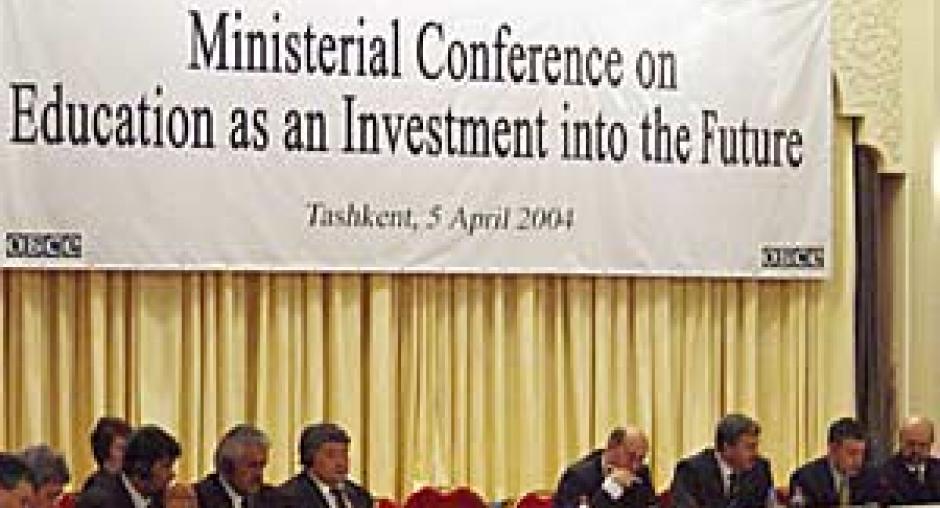Newsroom
OSCE Chairman offers Uzbekistan assistance with democratic transition questions
TASHKENT 6 April 2004

(OSCE/Keith Jinks)OSCE Chairman-in-Office Solomon Passy (2nd right) speaks at an international conference on education in Tashkent, 5 April, 2004. (OSCE/Keith Jinks) Photo details
TASHKENT, 6 April 2004 - During the first stop on his five-day visit to the Central Asian States, OSCE Chairman-in-Office, Bulgaria's Foreign Minister Solomon Passy, introduced the priorities of the OSCE agenda in separate meetings with the Foreign Minister, Sadiq Safayev, and the Speaker of the Olij Majlis (Parliament), Erkin Khalilov, and the Deputy Prime Minister, Alisher Azizkhodjaev.
In the evening, he was received by the President of Uzbekistan, Islam Karimov, and spent almost two hours in discussion over the OSCE agenda in Uzbekistan.
During the course of the day, Minister Passy also held meetings with representatives of political parties and civil society.
The Chairman-in-Office took the opportunity to repeat his expression of condolences to the victims of the recent spate of bomb attacks in Tashkent, as well as his condemnation of terrorism in all its forms and the readiness of the 55 OSCE States to work together in defeating it.
While praising the progress Uzbekistan had made since independence in overcoming "the heritage of the Soviet Empire", he discussed the further development of Uzbekistan in the direction of democracy and the market economy.
Passy said: "We understand the challenges facing you. The path of transition might be difficult, and sometimes painful. But ultimately implementing the needed reforms will improve the position of your country and your people."
One of the key issues on the OSCE agenda, he said, was to create a vibrant civil society by making the work of NGOs, including opposition political parties, easier. Referring to Bulgaria's national as well as his personal experience with non-governmental organizations, the Chairman-in-Office said: "The easier we make it, the better because governments do need NGOs. The best way is to stretch out a hand. I know this from working for 20 years with NGOs."
Turning to the question of media freedom, Minister Passy said, "It is better to act proactively and open the way for growth and diversity of opinion, and let the media become a natural ally."
During the meetings he expressed the readiness of the OSCE to deepen co-operation over other issues, including police and prison reform, the implementation of the UN Action Plan against the use of torture, anti-trafficking measures, and in the economic and environmental dimension.
In the evening, he was received by the President of Uzbekistan, Islam Karimov, and spent almost two hours in discussion over the OSCE agenda in Uzbekistan.
During the course of the day, Minister Passy also held meetings with representatives of political parties and civil society.
The Chairman-in-Office took the opportunity to repeat his expression of condolences to the victims of the recent spate of bomb attacks in Tashkent, as well as his condemnation of terrorism in all its forms and the readiness of the 55 OSCE States to work together in defeating it.
While praising the progress Uzbekistan had made since independence in overcoming "the heritage of the Soviet Empire", he discussed the further development of Uzbekistan in the direction of democracy and the market economy.
Passy said: "We understand the challenges facing you. The path of transition might be difficult, and sometimes painful. But ultimately implementing the needed reforms will improve the position of your country and your people."
One of the key issues on the OSCE agenda, he said, was to create a vibrant civil society by making the work of NGOs, including opposition political parties, easier. Referring to Bulgaria's national as well as his personal experience with non-governmental organizations, the Chairman-in-Office said: "The easier we make it, the better because governments do need NGOs. The best way is to stretch out a hand. I know this from working for 20 years with NGOs."
Turning to the question of media freedom, Minister Passy said, "It is better to act proactively and open the way for growth and diversity of opinion, and let the media become a natural ally."
During the meetings he expressed the readiness of the OSCE to deepen co-operation over other issues, including police and prison reform, the implementation of the UN Action Plan against the use of torture, anti-trafficking measures, and in the economic and environmental dimension.
